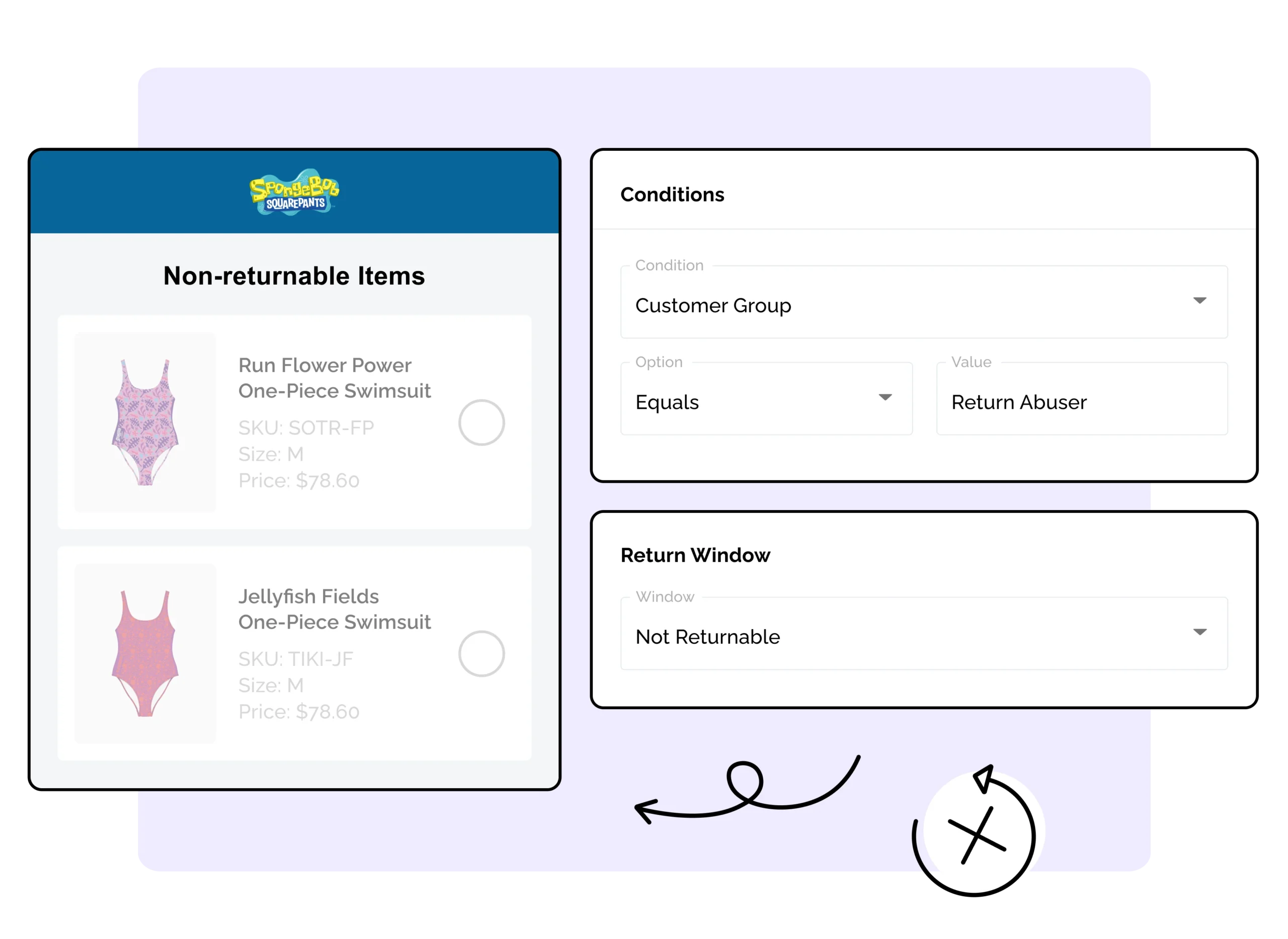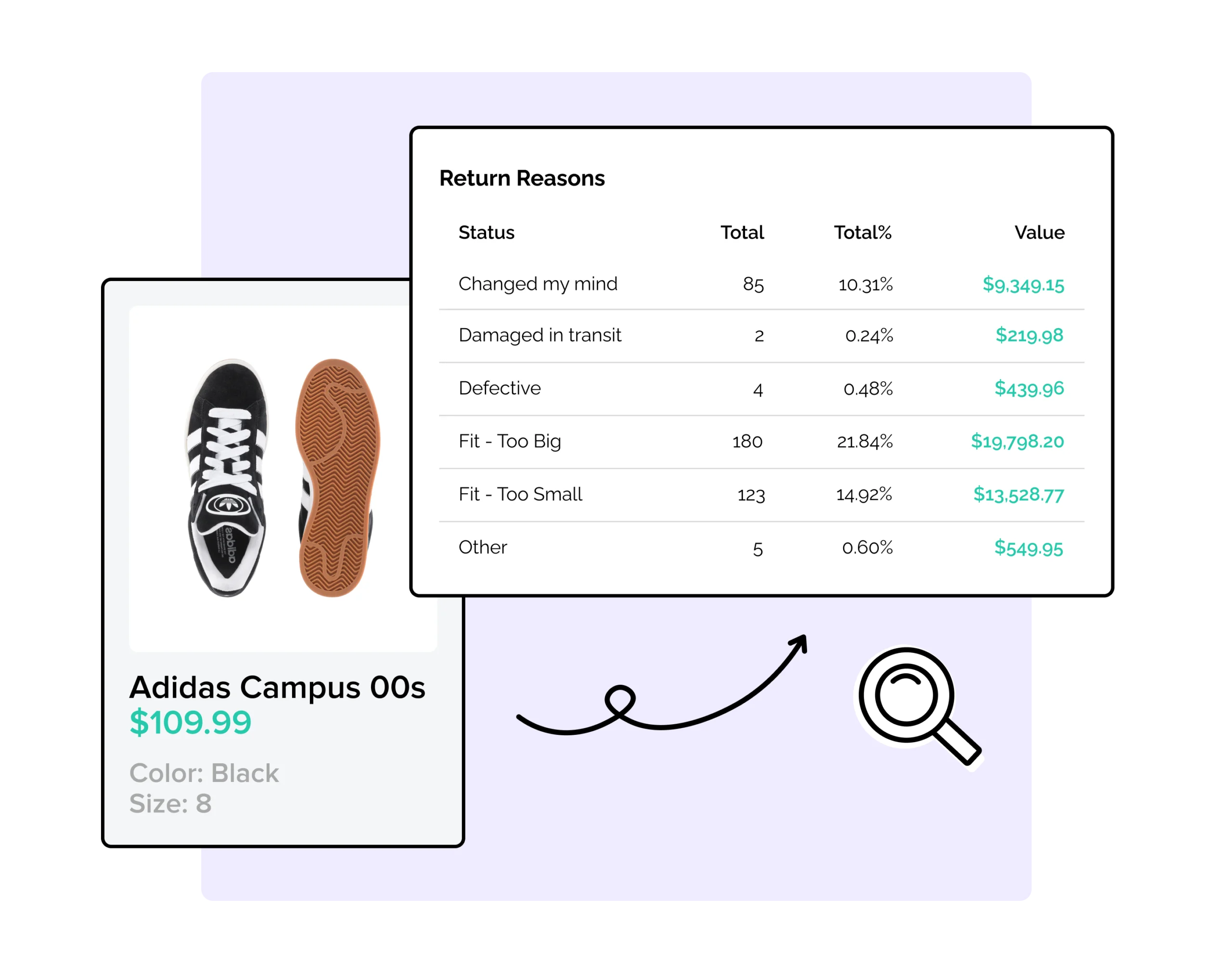Ecommerce Trends 2025: What to Watch from Shoptalk Subscribe to newsletter
At Shoptalk 2025, experts shared key trends set to transform e-commerce. In this article, we dive into AI personalization, unified commerce, and consumer behavior shifts. Discover the essential 2025 ecommerce trends from Shoptalk.
Key Takeaways
-
AI and personalization are critical for enhancing customer experiences and driving sales in e-commerce, with significant investments expected in these technologies.
-
Unified commerce strategies that integrate physical and digital retail are essential for providing a seamless shopping experience and meeting modern consumer expectations.
-
Consumer behavior is shifting toward values like transparency and sustainability, especially among Gen Z, necessitating brands to adapt their strategies to foster loyalty and engagement.
-
WeSupply turns post-purchase challenges into growth opportunities with branded tracking, self-service returns, fraud prevention, warranty management, analytics, and more—boosting loyalty, reducing costs, and driving revenue. Get Started with WeSupply—where every return becomes a revenue opportunity.
Introduction: Shaping the Future of E-commerce
Shoptalk 2025 stands as a beacon for retail leaders, showcasing the latest innovations and strategies that are set to transform the e-commerce landscape. The event brings together the entire retail ecosystem, including founder ceo, chief marketing officer, global chief marketing officer, chief merchandising officer, chief business strategy officer, and chief technology officer, to discuss leveraging technology for enhanced customer engagement and seamless digital transformation.
Staying ahead of these trends is crucial for brands and retailers to adapt to evolving shopper preferences and improve customer satisfaction. By leveraging cutting-edge technologies and industry insights, businesses can craft a customer journey that resonates with modern consumers and fosters loyalty.
The focus this year is on pinpointing emerging trends set to shape the future of retail. From AI-powered personalization to unified commerce strategies, Shoptalk 2025 offers invaluable retail insights that will help businesses navigate the digital transformation and stay competitive in a dynamic market.
AI & Personalization: The Competitive Edge in 2025
AI has become a cornerstone of the e-commerce sector, with investments projected to reach $9.01 billion in 2025. Enhancing customer engagement and satisfaction through technology has become essential. By integrating advanced technology solutions, businesses can anticipate and meet customer needs in real-time, securing a competitive edge.
The future of retail hinges on the ability to deliver personalized experiences that cater to the unique preferences of each customer. With cutting-edge technologies like AI and machine learning, businesses can create hyper-personalized experiences that drive customer loyalty and boost sales.
Businesses utilizing AI for customer interactions are expected to see significant improvements in customer satisfaction and retention.
AI-Powered Personalization: Enhancing Customer Experiences
AI-driven personalization is transforming the customer journey by offering tailored recommendations that elevate the shopping experience. Hyper-personalized experiences can boost average revenue per user by 166%, providing predictive offerings that cater to individual preferences. Leading brands are already leveraging AI to create dynamic, personalized shopping experiences that keep customers coming back.
However, the balance between personalization and privacy remains crucial. Customers appreciate personalized experiences but also value their privacy. Brands must navigate this delicate balance to maintain trust and loyalty. Notably, 31% of customers are more likely to remain loyal to brands that provide personalized shopping experiences, highlighting the value of AI-driven personalization.
Case studies from industry leaders illustrate the transformative impact of AI-powered personalization. These cases demonstrate how hyper-personalization can boost retailer revenue by up to 40% over non-personalized experiences, showcasing AI’s potential in e-commerce.
Boosting Sales Through Personalized Promotions
AI is transforming promotional strategies by optimizing pricing and personalizing offers for individual customers. AI algorithms analyze extensive datasets to enhance customer engagement with personalized marketing solutions. This approach transforms one-time promotions into ongoing, context-aware interactions that resonate with customers.
Personalized marketing strategies like loyalty bonuses, conversion perks, and affiliate incentives drive sales and improve customer satisfaction. Industry insights reveal that AI’s role in analyzing customer behavior is crucial for optimizing pricing and crafting personalized promotions that enhance the overall customer experience.
Enhancing Customer Satisfaction with AI & Machine Learning
AI and machine learning are pivotal in anticipating customer needs and boosting satisfaction. AI technology offers proactive service by accurately predicting customer intent and adapting to real-time behavior changes. Such anticipation is crucial for enhancing customer satisfaction and loyalty.
Generative AI is increasingly used for automated customer service, improving response efficiency and promptly addressing customer inquiries. Real-world applications from major retailers demonstrate how AI can enhance customer engagement and satisfaction by providing timely and accurate support.
Unified Commerce: The Blending of Physical and Digital Worlds
Unified commerce, the next step in omnichannel retail, integrates all sales channels to create a cohesive customer journey. This approach blends physical and digital worlds, ensuring that customers enjoy a seamless shopping experience regardless of the channel they choose.
Omnichannel strategies are vital for driving in-store visits and boosting customer engagement. Integrating digital and physical retail allows businesses to cater to evolving shopper preferences and create a unified retail ecosystem.
Unified Commerce Strategies: The Omnichannel Imperative
Combining digital and physical retail is essential for delivering seamless shopping experiences. Over 70% of digital retailers in the US emphasize the importance of omnichannel strategies to enhance their business operations. A centralized data management system is key to delivering personalized experiences across different retail channels.
Successful unified commerce models demonstrate the benefits of a cohesive customer journey, driving brand loyalty and enhancing satisfaction. Industry insights reveal that seamless shopping experiences are key to meeting modern consumer expectations and staying competitive in the retail market.
The Role of Virtual & Physical Shelves
Consumers increasingly prefer to shop across multiple channels, indicating a shift towards an integrated shopping experience. Virtual shelves, electronic shelf labels, and real-time inventory tracking are bridging the gap between online and offline shopping. These technologies enhance the retail experience by providing up-to-date product information and availability.
Data reveals that 65.8% of US consumers use multiple channels when shopping, underscoring the importance of unified commerce. By leveraging both physical and virtual shelves, retailers can cater to the diverse shopping preferences of modern consumers.
Managing Digital Transformation in Retail
Automated inventory management and supply chain solutions are transforming the retail industry. AI-driven inventory management is becoming a critical component of efficient supply chain operations, helping retailers forecast trends and optimize their supply chains. Amazon and Target are leading the way in using AI for demand forecasting, ensuring that their inventory levels align with customer demand.
Big data analytics is crucial for managing digital transformation. Retailers can use these insights to forecast trends, optimize supply chains, and boost customer satisfaction. Corporate restructuring is influencing digital transformation, with businesses adapting strategies to remain competitive in a rapidly evolving market.
The Evolution of AI in E-commerce
AI investment in e-commerce is projected to exceed $8 billion by 2024, reflecting its growing importance. AI is set to transform e-commerce by enhancing customer interactions and optimizing sales processes. AI-driven solutions are reshaping how businesses engage with customers and deliver personalized experiences.
The future of retail hinges on leveraging AI for smarter, more efficient operations. AI’s role in enhancing customer engagement and driving sales will be critical for businesses looking to stay ahead of the competition in a rapidly evolving market.
The Role of Generative AI in E-commerce Growth
Generative AI is set to revolutionize e-commerce by reshaping search and discovery. Market projections show that generative AI integration will lead to a 10% increase in online sales due to improved personalization. This technology aids in crafting dynamic product descriptions that align with current consumer preferences, enhancing the overall shopping experience.
The move from keyword-based to context-aware search is transforming online product discovery. Generative AI helps businesses improve product visibility and enhance customer engagement, driving e-commerce growth.
Generative AI & Search Evolution: Smarter Shopping Experiences
AI-powered semantic search enables real-time adaptations to user queries, improving product discoverability. This technology improves product recommendations, ensuring customers quickly find what they need.
Case studies of brands using AI for search highlight its benefits. AI-driven semantic search enhances customer satisfaction and engagement, providing a smarter shopping experience for modern consumers.
Enhancing Customer Engagement with AI
AI technologies enhance customer engagement through personalized shopping experiences based on predictive analytics. More than 42% of e-commerce companies are adopting AI tools to improve customer service, underscoring AI’s role in driving loyalty and retention.
AI-driven interactions are essential for boosting customer satisfaction and engagement. Using AI for dynamic product recommendations and personalized marketing strategies helps businesses create meaningful connections with customers, fostering loyalty and trust.
Social Commerce & Content-Driven Shopping
Social commerce is growing rapidly, with projections indicating the industry will exceed $1 trillion by 2028. This trend reflects the increasing importance of content-driven shopping and the role of user-generated content in shaping consumer trust at this market stage.
Brands utilizing user-generated content can build authenticity, enhance customer engagement, drive sales, and boost satisfaction. Understanding the power of social commerce allows businesses to stay ahead and meet evolving consumer preferences.
Leveraging User-Generated Content for Authenticity
User-generated content (UGC) is a powerful tool for brands aiming to build trust and increase conversions. AI-powered content curation can create more engaging experiences by showcasing authentic customer reviews and testimonials. Brands like GoPro and Starbucks have successfully incorporated UGC into their marketing strategies, enhancing brand loyalty and credibility.
Encouraging user participation boosts customer loyalty and engagement. Brands that leverage UGC tend to see significantly higher engagement rates compared to those relying solely on traditional advertising methods. This strategy not only boosts sales but also fosters a sense of community and connection among customers.
Social Listening for Trend Identification
Social listening keeps brands ahead of emerging trends by analyzing real-time consumer conversations. By distinguishing between fads and lasting shifts in consumer behavior, businesses can tailor their marketing strategies to meet genuine consumer needs.
Case studies of brands adapting strategies through social insights highlight the importance of this approach. Actively analyzing social media discussions helps brands identify emerging trends and respond proactively, ensuring relevance in a dynamic market.
Retail Media Insights: The Power of Data-Driven Marketing
Retail media networks are becoming essential for brands, offering targeted advertising opportunities and optimized marketing efforts. The retail media market is projected to reach $179.5 billion, indicating a robust shift towards data-centric marketing tactics.
Data-driven marketing strategies depend on insights from social media interactions and consumer preferences. Brands using retail media networks can drive sales and boost customer loyalty by delivering personalized marketing experiences that resonate with their audience.
Consumer Behavior & Evolving Shopping Expectations
Transparency and sustainability increasingly influence consumer behavior, affecting purchasing decisions and brand loyalty. Modern consumers demand consistent, empathetic, and personalized interactions across multiple channels in the realm of global business marketing.
Brands that align with consumer values, such as transparency and sustainability, can significantly enhance customer loyalty. By embracing these evolving expectations, businesses can create meaningful connections with their customers, fostering long-term relationships and enhancing customer satisfaction.
Gen Z’s Influence on the Future of Shopping
Gen Z is reshaping e-commerce trends with their emphasis on social commerce, sustainability, and personalized experiences. Brands need to adopt strategies that capture Gen Z’s loyalty by aligning with their values and preferences.
Grasping Gen Z’s influence is crucial for staying ahead in the retail market. Identifying emerging trends and adapting to evolving shopper preferences helps businesses create retail experiences that resonate with Gen Z.
Customer-Centric Approaches: Hospitality, Convenience & Purpose
Transitioning from transactions to experiential retail is key in 2025. Customer-centric approaches focusing on hospitality, convenience, and purpose can enhance satisfaction and engagement.
Unified commerce strategies play a crucial role in enhancing the customer journey, providing a seamless shopping experience across all channels. Delivering convenience and embracing retail hospitality helps brands meet evolving consumer expectations and foster long-term loyalty.
Anticipating Customer Needs with AI & Data Analytics
AI and data analytics are crucial for predicting consumer behavior and driving smarter decision-making. Leveraging technology allows brands to anticipate customer needs and deliver personalized experiences that boost satisfaction and engagement.
Generational consumer insights are vital for understanding the preferences of different demographics, especially Gen Z. By utilizing AI-powered insights, businesses can stay ahead of emerging trends and meet the ever-changing shopper preferences, ensuring long-term success in the retail market.
Retail Innovation & Operational Efficiency
Retailers are increasingly adopting advanced technologies to improve efficiency and customer experiences. Innovations like AI and automation optimize store operations and improve supply chain management, driving operational efficiency and customer satisfaction. Additionally, Americas retail services play a crucial role in this transformation.
Embracing these trends allows retailers to stay competitive, deliver superior customer experiences, and enhance overall business operations.
Optimizing Store Operations with AI & Automation
AI and automation are revolutionizing store operations with technologies like cashierless stores and robotic inventory systems streamlining processes. AI systems predict inventory needs and reduce waste, while robotic systems improve order fulfillment accuracy and speed.
Automated customer service solutions like chatbots enhance customer satisfaction by providing timely and efficient support. These technological advancements are critical for optimizing store operations and delivering a seamless customer experience.
Enhancing the In-Store Shopping Experience
Combining digital and physical experiences is key to enhancing in-store shopping. Technologies like smart shopping carts, virtual try-ons, and automated checkout create immersive and convenient shopping experiences.
Interactive store displays and augmented reality are being employed to engage customers and enhance their shopping journey. Leveraging these innovative technologies helps retailers meet evolving consumer expectations and boost sales.
The Rise of Tech-Driven Retail Partnerships
Collaborations between brands and tech companies drive innovation in retail. AI-powered marketing partnerships enable personalized customer interactions and tailored promotional strategies. Successful case studies showcase the benefits of strategic alliances in developing innovative retail solutions and improving operational capabilities.
By fostering tech-driven retail partnerships, businesses can enhance customer engagement and stay competitive in the evolving retail landscape.
Combat inconvenience with proactivity & self service
Book a quick call with our experts to see how WeSupply can help you make returns easy for your customers with a beautiful, self-service solution that makes their experience easier while also providing new ways to lower costs and earn back revenue.
Elevating the Post-Purchase Experience: Turning Returns into Revenue with WeSupply
As brands focus on enhancing customer-centric strategies and operational efficiency, the post-purchase experience is emerging as a critical area for driving loyalty and revenue. At Shoptalk 2025, WeSupply will emphasize that a seamless post-purchase journey—covering tracking, returns, and warranty management—is no longer optional but a competitive differentiator.
WeSupply offers a robust post-purchase solution designed to reduce operational overhead while improving customer satisfaction and retention. By automating key touchpoints after checkout, brands can turn common friction points into opportunities for engagement and revenue recovery.
Social Listening for Trend Identification
- Branded Tracking Pages – Keep customers informed with real-time delivery updates, reducing WISMO inquiries.
- Self-Service Returns & Exchanges Portal – Empower customers to initiate returns or opt for exchanges, preserving revenue through upsell opportunities.
- Shipping and Returns Protection – Safeguard revenue, offer free returns, and increase customer trust with built-in protection features.
-
Fraud Prevention Tools – Automatically detect suspicious activity and prevent return scams, preserving profit margins.
-
Accurate Delivery Promise Dates – Display estimated delivery dates at checkout to set expectations, increase conversions, and reduce cart abandonment.
- In-Store & Curbside Pickup Management – Streamline BOPIS, curbside pickups, and POS returns for a true omnichannel experience.
- Warranty Management – Simplify warranty registration and claims processing while collecting actionable product data.
-
Revenue Recovery Tools – Recapture lost revenue through exchange upsells, loyalty incentives, and efficient return item inspections.
-
Integration with Review Platforms – Seamlessly collect and showcase customer reviews and user-generated content across multiple platforms to build trust, increase engagement, and drive sales.
-
Return Analytics – Gain actionable insights into return reasons, identify serial returners, and reduce return rates with detailed data accessible directly in BigQuery.
-
CSAT and NPS Tracking – Measure CSAT, NPS, and CES to identify experience gaps, improve satisfaction, and optimize the post-purchase journey using real customer feedback.
By implementing solutions like WeSupply, retailers can align their post-purchase strategy with modern consumer expectations—creating frictionless, transparent, and revenue-generating experiences long after checkout. This shift transforms returns and operational challenges into powerful levers for growth, retention, and customer loyalty in 2025 and beyond.
Key Takeaways & Future Outlook
Shoptalk 2025 offered invaluable insights into emerging trends and innovations shaping the future of e-commerce. The emphasis on AI, unified commerce, and evolving consumer behaviors underscores the need to stay ahead of technological advancements and market shifts.
To prepare for the future of retail, businesses must adopt strategies leveraging logistics optimization, seamless payment solutions, and mobile commerce. Embracing these trends allows brands to enhance customer engagement and drive long-term success in global business solutions.
Shoptalk 2025 Keynote Highlights: Innovations Shaping E-commerce
Key insights from over 200 senior retail and e-commerce leaders at Shoptalk 2025 emphasize the importance of AI, sustainability, and digital transformation in shaping the future of retail. The event highlighted the need for businesses to adopt a customer-centric approach, addressing modern shopper needs through technology.
Discussions on retail media, virtual and augmented reality, and ethical consumerism provided valuable industry insights for staying competitive in the market. By focusing on these emerging trends, businesses can enhance customer engagement and drive innovation in the e-commerce sector.
The Future of E-commerce: Preparing for 2025 & Beyond
As e-commerce continues to evolve, brands must focus on optimizing logistics, adopting seamless payment solutions, and leveraging AI for personalization. Predictions for the next five years indicate significant growth driven by technological innovations and changing consumer behaviors.
To stay ahead, businesses should embrace emerging technologies and adapt to the ever-changing retail landscape. By preparing for these shifts, brands can enhance customer engagement, drive loyalty, and achieve long-term success in the e-commerce sector.
Simplify Returns for Your Customers and Support Team
Book a quick call with our experts to see how WeSupply can help you: simplify the Return experience with just a few clicks, reduce customer service calls and manual processing, notify your customer about their refund, automate returns and reduce user error.
Summary
Shoptalk 2025 has shed light on the critical trends shaping eCommerce—AI-powered personalization, unified commerce, evolving consumer behaviors, and Gen Z influence. Staying competitive means embracing these innovations and technologies to enhance engagement, loyalty, and long-term growth.








